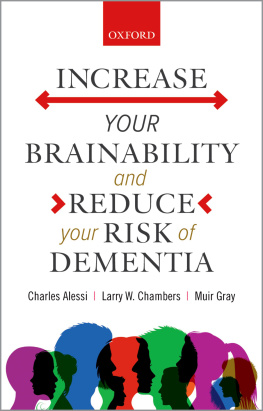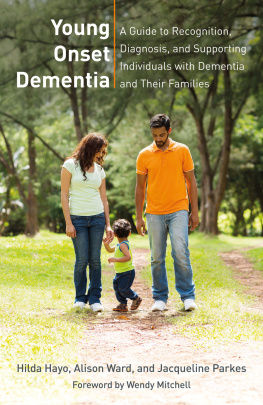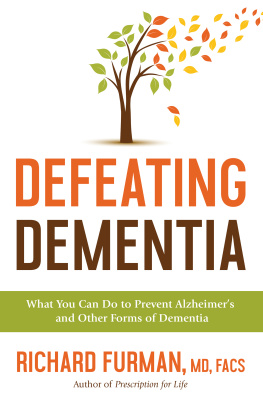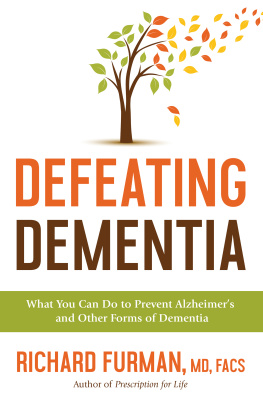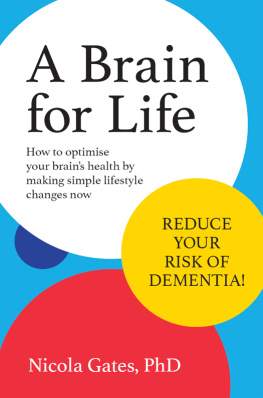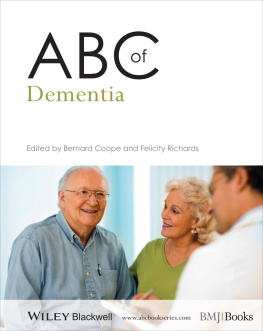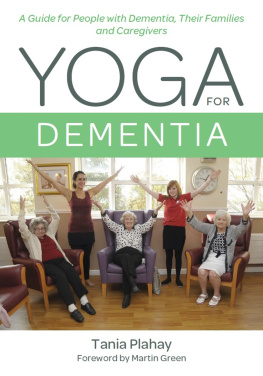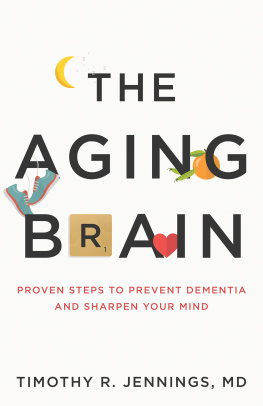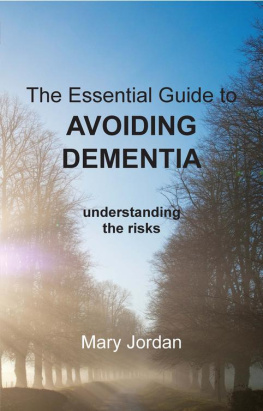Charles Alessi - Increase your brainability-and reduce your risk of dementia
Here you can read online Charles Alessi - Increase your brainability-and reduce your risk of dementia full text of the book (entire story) in english for free. Download pdf and epub, get meaning, cover and reviews about this ebook. year: 2021, genre: Romance novel. Description of the work, (preface) as well as reviews are available. Best literature library LitArk.com created for fans of good reading and offers a wide selection of genres:
Romance novel
Science fiction
Adventure
Detective
Science
History
Home and family
Prose
Art
Politics
Computer
Non-fiction
Religion
Business
Children
Humor
Choose a favorite category and find really read worthwhile books. Enjoy immersion in the world of imagination, feel the emotions of the characters or learn something new for yourself, make an fascinating discovery.
- Book:Increase your brainability-and reduce your risk of dementia
- Author:
- Genre:
- Year:2021
- Rating:4 / 5
- Favourites:Add to favourites
- Your mark:
- 80
- 1
- 2
- 3
- 4
- 5
Increase your brainability-and reduce your risk of dementia: summary, description and annotation
We offer to read an annotation, description, summary or preface (depends on what the author of the book "Increase your brainability-and reduce your risk of dementia" wrote himself). If you haven't found the necessary information about the book — write in the comments, we will try to find it.
Increase your brainability-and reduce your risk of dementia — read online for free the complete book (whole text) full work
Below is the text of the book, divided by pages. System saving the place of the last page read, allows you to conveniently read the book "Increase your brainability-and reduce your risk of dementia" online for free, without having to search again every time where you left off. Put a bookmark, and you can go to the page where you finished reading at any time.
Font size:
Interval:
Bookmark:


Great Clarendon Street, Oxford, OX2 6DP,
United Kingdom
Oxford University Press is a department of the University of Oxford. It furthers the Universitys objective of excellence in research, scholarship, and education by publishing worldwide. Oxford is a registered trade mark of Oxford University Press in the UK and in certain other countries
Oxford University Press 2021
The moral rights of the authors have been asserted
Impression: 1
First Edition published in 2021
All rights reserved. No part of this publication may be reproduced, stored in a retrieval system, or transmitted, in any form or by any means, without the prior permission in writing of Oxford University Press, or as expressly permitted by law, by licence or under terms agreed with the appropriate reprographics rights organization. Enquiries concerning reproduction outside the scope of the above should be sent to the Rights Department, Oxford University Press, at the address above
You must not circulate this work in any other form and you must impose this same condition on any acquirer
Published in the United States of America by Oxford University Press
198 Madison Avenue, New York, NY 10016, United States of America
British Library Cataloguing in Publication Data
Data available
Library of Congress Control Number: 2021932625
ISBN 9780198860341
eISBN 9780192604170
DOI: 10.1093/oso/9780198860341.001.0001
Oxford University Press makes no representation, express or implied, that the drug dosages in this book are correct. Readers must therefore always check the product information and clinical procedures with the most up-to-date published product information and data sheets provided by the manufacturers and the most recent codes of conduct and safety regulations. The authors and the publishers do not accept responsibility or legal liability for any errors in the text or for the misuse or misapplication of material in this work. Except where otherwise stated, drug dosages and recommendations are for the non-pregnant adult who is not breast-feeding
Links to third party websites are provided by Oxford in good faith and for information only. Oxford disclaims any responsibility for the materials contained in any third party website referenced in this work.
We wrote this book to persuade readers to abandon negative and pessimistic beliefs about living longer because the science is clear that much of what happens to us is not the result of ageing, a normal biological process which cannot be slowed or reversed. Instead, science shows that many of the changes we have blamed on ageing are the result of other environmental factors which can be influenced. Furthermore, strong evidence from research has revealed many of these changes that were wrongly assumed to be the result of ageing can be prevented or delayed. We need to be positive, not negative, and being positive is also good for ones wellbeing.
People need this information, which in 2021 is of both vital and urgent importance, because the effects of lockdown have aggravated many of the problems that adversely affect physical and mental wellbeing.
This book was written for someone without a clinical qualification but many of our colleagues in our health systems are just as confused about ageing and dementia as members of the public and for them, as well as for the public we have provided references to the best science.
Our plan is to use this text as the platform for a major learning programme for people of all ages because, in the words of the Lancet which it used to launch the report of its Commission on Dementia, it is never too early and never too late to take action to increase the ability of the brain and reduce the risk of dementia.
Former Scientific Advisor to the Alzheimer Society of Canada, Professor Chambers research career has contributed to our understanding of many issues for people living with dementia. As a leader of the Canadian Study on Health and Aging, this was the first nation-wide Canadian population study of dementia prevalence, incidence, and caregiver issues by following the health trajectory of 10,000 older adult Canadians for 10 years. Professor Chambers co-led with the award-winning community wide program to prevent cardiovascular disease, a major cause of dementia. The Cardiovascular Health Awareness Program has received awards from the British Medical Journal, Canadian Institutes for Health Research, American Heart Association, and the Canadian Medical Association Journal. Professor Chambers work on evaluating the effectiveness of community screening for the signs of dementia has received international recognition. With his colleagues, he has created E-learning education resources to promote interprofessional education with physicians, pharmacists, nurses, and nurse practitioners in care facilities, the main location of people living with advanced dementia in our communities. For these groups, he has created greater access to library services, establishment of a system-wide seniors health knowledge network, as well as promotion of partnerships between academic and service delivery organizations such as care homes. Early in his career, Professor Chambers was an international scientific exchange fellow with the Research Unit on Neuropsychiatry: Epidemiology and Clinical Research, INSERM (medical research council), University of Montpellier, France. He has served on expert panels for Health Canada, US Institute of Medicine, WHO, and Pan American Health Organization. He has authored 18 books, 21 chapters in books, and 180 papers in refereed journals. Professor Chambers presently is Research Director of the Niagara Regional Campus, Michael G. DeGroote School of Medicine, McMaster University. He maintains appointments with the Department of Research Methods, Evidence, and Impact, McMaster University (Professor Emeritus); as well as with the Bruyre Research Institute., Faculty of Health at York University and IC/ES, Ontarios leading health and social data research organization. From 2013 to 2017, he was Scientific Advisor to the Alzheimer Society of Canada. He is a Fellow with the American College of Epidemiology, Honorary Fellow with the Faculty of Public Health of the United Kingdom and Fellow of the Canadian Academy of Health Sciences.
Muir Gray entered the Public Health Service in Oxford in 1972 after qualifying in medicine in Glasgow. He is a consultant in public health.
He has been working with both NHS England and Public Health England with the aim of increasing value for both populations and individuals and published How To Get Better Value Healthcare in 2007. The means of doing this through systems and personalization is now called population healthcare and the aim of population healthcare is to maximize value and equity by focusing not on institutions, specialties, or technologies, but on populations defined by a common symptom such as breathlessness, condition such as type 1 or type 2 Diabetes or by a common characteristic, such as multiple morbidity.
Recently he has returned to his first public health missionpreventing the changes we assume are due to ageing and disease by getting the right attitude and fighting back against an environment that makes us inactive. His key books include Sod70! And, with Diana Moran, Sod Sitting, Get Moving! He is the Director of the Optimal Ageing Programme at Oxford and its mission is to lead cultural revolution to change the way we think about living longer and this is now a national network involving all the key agencies with the manifesto and resources available at www.livelongerbetter.uk
Font size:
Interval:
Bookmark:
Similar books «Increase your brainability-and reduce your risk of dementia»
Look at similar books to Increase your brainability-and reduce your risk of dementia. We have selected literature similar in name and meaning in the hope of providing readers with more options to find new, interesting, not yet read works.
Discussion, reviews of the book Increase your brainability-and reduce your risk of dementia and just readers' own opinions. Leave your comments, write what you think about the work, its meaning or the main characters. Specify what exactly you liked and what you didn't like, and why you think so.

